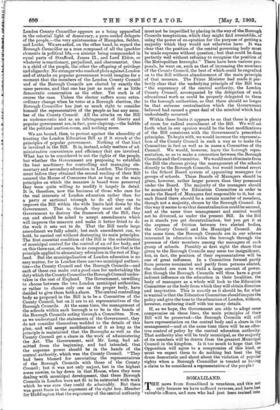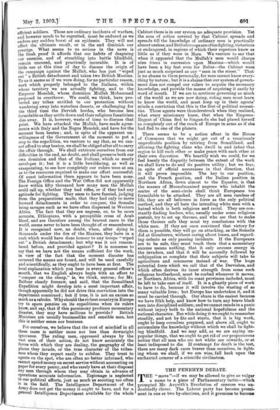SOMALILAND. T HE news from Somaliland is vexatious, and this not
only because we have suffered reverses, and have lost valuable officers, and men who bad just been trained into efficient soldiers. Those are ordinary incidents of warfare, and however much to be regretted, must be endured as we endure any sudden burst of an epidemic. They will not affect the ultimate result, or in the end diminish our prestige. What seems to us serious in the news is the fresh proof it affords that our habits of despising our enemies, and of stumbling into battle blindfold, remain uncured, and practically incurable. It is of little use at this time of day to discuss the origin of the campaign against the Mullah, who has just "wiped out " a British detachment and taken two British Maxims. To us it seems as if we were doing, for no particular reason, work which properly belonged to the Italians, within whose territory we are actually fighting, and to the Emperor Menelek, whose dominion Mullah Mohammed proposed to overthrow. We could, we think, have pro- tected any tribes entitled to our protection without wandering away into waterless deserts, or challenging for the third time the Dervish hordes, who become less formidable as they settle down and their religious fanaticism dies away. It is, however, waste of time to discuss that point. We have attacked the Mullah, have made agree- ments with Italy and the Negus Menelek, and have for the moment been beaten ; and, in spite of the apparent un- willingness of the Government at the moment to put a stop to the expedition, we venture to say that, as we can- not afford to stay beaten, we shall be obliged after all to carry the affair through. We shall extricate ourselves from our difficulties in the end, no doubt, and shall preserve both our own dominion and that of the Italians, which so nearly envelopes it ; but it is a little bewildering, as well as exasperating, to see how completely our rulers were at sea as to the resources required to make our effort successful. Of exact information there appears to have been none. The Foreign Office and the War Office did not apparently know within fifty thousand how many men the Mullah could call up, whether they had rifles, or if they had any aptitude for fighting. They seem to have fancied, judging from the preparations made, that they had only to move forward detachments in order to conquer, the Somalis being savages such as we have often dispersed in Western Africa. The fact that they are negroes, or, to be more accurate, Ethiopians, with a perceptible cross of Arab blood, and are therefore among the bravest races in the world, seems never to have been thought of or remembered. It is recognised now, no doubt, when, after dying in thousands under the fire of the Maxims, they have in a rush which would have done honour to any troops " wiped out" a British detachment; but why was it not remem- bered before, and provided against ? It is nonsense to say that we have not the means sufficient for the work, in view of the fact that the moment disaster has occurred the means are found, and will be used carefully and scientifically, as they ought to have been at first. The local explanation which you hear in every general officer's mouth, that we English always begin with an effort to " conquer on the cheap," is, we think, untrue ; for Mr. Balfour clearly foresaw, and said, that the Somaliland Expedition might develop into a most important affair, though apparently he did not drive this conviction into the department concerned ; but if true, it is not an excuse so much as a rebuke. Why should the richest country in Europe try to spare pennies on its expeditions when its rulers know, and say, that if this parsimony produces momentary disaster, they may have millions to provide ? British Ministers are usually businesslike and sensible men, but this is neither sense nor business.
For ourselves, we believe that the root of mischief in all these cases is neither more nor less than downright ignorance. The ruling men, oppressed always by the vast area of their action, do not know accurately the forces with which they are dealing, the geography of the places they invade, or the true character of the tribes- men whom they expect easily to subdue. They trust to agents on the spot, who are often no better informed, who cannot spend money on secret service without accounting on paper for every penny, and who rarely have at their disposal any men through whom they may obtain, in advance of operations accurate information. Espionage is neglected in our political efforts, just as much as scouting too often is m the field. The Intelligence Department of the Army does not get the money it ought to have, and for a general Intelligence Department available for the whole Cabinet there is in our system no adequate provision. Yet the area of action covered by that Cabinet spreads and spreads till the knowledge of ordinary men is practically almost useless, and British troops are often fighting, victorious or endangered, in regions of which their superiors know as little as if they were in Mars. We venture to say that when it appeared that the Mullah's men would charge nine times in succession upon Maxims—which would have been a big feat even for Zulus—the Cabinet were just as much surprised as any "man in the street." That is no shame to them personally, for men cannot know every- thing by nature ; but it is a shame that our system of govern- ment does not compel our rulers to acquire the necessary knowledge, and provide the means of acquiring it easily by word of mouth. If we are to continue governing as much of the world as we are now doing, ruling men must learn to know the world, and must keep up in their agents' minds a conviction that this is the first of political necessi- ties. Those agents were thunderstruck when they realised, what every missionary knew, that when the Empress- R,egent of China fled to Singan-fu she had placed herself as completely out of the reach of Europe in arms as if she had fled to one of the planets.
There seems to be ' a notion afloat in the House of Commons that we might get out of a vexatiously unprofitable position by retiring from Somaliland, and allowing the fighting clans who dwell in and infest that region to kill each other or make peace with each other at their own discretion. We heartily wish we could, for we feel keenly the disparity between the extent of the work we shall have to do and its positive utility ; but we fear, in spite of official assurances in that direction, that it will prove impossible. The key to our position, and the French position, and the Italian position in Northern Africa, down almost to the Equator, is that the masses of Mussulmanised negroes who inhabit the centre of the semi-circle shall think Europeans too formidable to be attacked. They are all men careless of life, they are all believers in force as the only political method, and they all hate the intruding white men with a hatred which is both religious and racial. They are con- stantly finding leaders, who, usually under some religious pretext, try to set up thrones, and who see that to make those thrones safe they must try conclusions with the white men. If they are once convinced that victory for them is possible, they will go on attacking, as the Somalia did at Gumburru, without caring about losses, and regard- ing defeats as only passing incidents. If the Europeans are to be safe, they must teach them that a momentary success means nothing, that it only arouses energy in the invaders, and that it will be assuredly followed by subjugation so complete that their subjects will take to agriculture and commerce instead of war. The huge potential force which we call that of the Dervishes, and which often derives its inner strength from some such religious brotherhood, must be curbed whenever it moves, or Northern Africa, with its coast provinces included, must be left to take care of itself. It is a ghastly piece of work to have to do, because it will involve the wasting of so many valuable lives ; but Europe has undertaken it, and it must be carried through. Our share is the easiest because we have Sikh help, and know how to turn any brave black men into disciplined soldiers; and we cannot recede in a panic without injury both to the national hopefulness and the national character. But while doing it we ought to remember steadily, and not by fits and starts, that it is big work, ought to keep ourselves prepared, and above all, ought to accumulate the knowledge without which we shall be fight- ing blindfold. And we may add, as we are saying un- popular things, that we ought to get rid of our preposterous notion that all men who are not white are cowards, or at least indisposed to die. If contempt for death is the test, there are many dark races braver than ourselves, in fight- ing whom we shall; if we are wise, fall back upon the enchanted armour of a scientific civilisation.











































 Previous page
Previous page